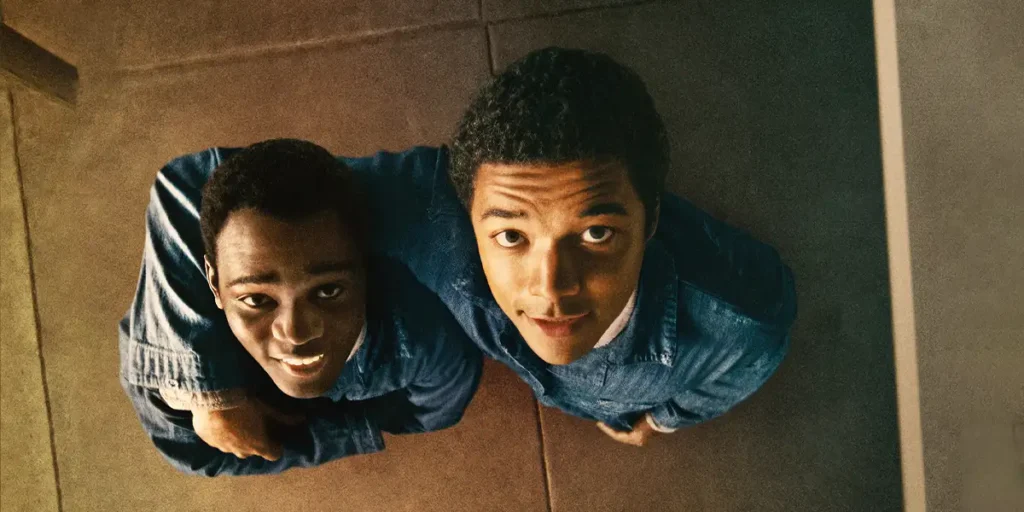Nickel Boys, the stunning film adaptation of Colson Whitehead’s award-winning novel of the same name, is destined to become a classic of American cinema.
Director: RaMell Ross
Genre: Drama
Run Time: 140′
Rated: PG-13 (US) / BBFC12A (UK)
BFI London Film Festival Screening: October 14-19, 2024
U.K. Release Date: November 8
U.S. Release Date: December 13, 2024
Where to Watch: in UK & Irish cinemas and in select US theaters
Nickel Boys, RaMell Ross’ follow-up to the evocative documentary Hale County This Morning, This Evening (2018), is a special film. It’s a sentiment that is fairly obvious from the first scene, in which Ross drops us into the first person point of view of Elwood Curtis (played in these early scenes by youngster Ethan Cole Sharp), a young African-American boy living in Florida during the 1950s and 60s. From Elwood’s viewpoint, we see the rays of sunlight streaking through the trees and a leaf twirling through his fingers, hear an offscreen voice calling his name for dinner, and listen to the slow, relaxed breathing of the character. The effect is transportative and disarmingly powerful.
Based on Colson Whitehead’s 2019 Pulitzer Prize-winning novel, “The Nickel Boys”, Ross and co-writer Joslyn Barnes’ (Harvest) extraordinary adaptation similarly alternates between the 1960s and 2010s, following Elwood’s teenage years at the abusive, now-defunct Nickel Academy and his adult life as he is forced to look back on his years there as details of the abuse come to light in the public. As a teenager, which is where most of Nickel Boys is centred, Elwood is played by Ethan Herisse (When They See Us), with Daveed Diggs (Blindspotting) as the adult Elwood.
Told largely through Elwood’s POV, as well as occasionally from his friend Turner’s (Brandon Wilson, Murmur), Nickel Boys also features more experimental imagery and archival footage, all of which feed into Elwood’s experiences. Ross constantly reminds us that we are viewing snippets of memories and history, via scattered imagery, swift editing, and intense close-ups. And in the more intense moments of suffering, Ross largely avoids cheapening the film by showing anything too graphic, instead opting for clever cuts or enhanced sound design.
Nickel Boys’ unique style is never used in a gimmicky way; Ross and his cinematographer Jomo Fray (All Dirt Roads Taste of Salt) utilise it in the most necessary fashion, in order to as accurately as possible portray the abusive and dangerous conditions that many young Black men faced at schools like Nickel Academy, which itself is based on the real life Dozier School for Boys. The POV can occasionally be jarring during dialogue, but Ross’ rigorous commitment to it reinforces the notion that a real story like this needs to be told in such a drastic way, helping to get across intense realism and a historically accurate tone. Ross is also not afraid to allow himself some freedoms to bring the story and subject together by using the aforementioned flitting imagery and archival clippings.

Herisse and Wilson, who share much of the screen time together in Nickel Boys, give two outstanding performances. Herisse brings a timid but ultimately defiant air to his enthralling character, whilst Wilson’s charisma and confidence bring forth Turner’s despairing but occasionally hopeful attitude to his situation. Aunjanue Ellis-Taylor (King Richard) as Hattie, Elwood’s grandmother, is always on screen when she is involved in a scene, and consistently gives a powerhouse performance of expressive emotion.
Ross’ ability to meld such dramatic cinematic form without reducing the impact of Nickel Boys’ story is deeply impressive; there is a subtlety to the film, despite its firm technical identity, enhanced by many of its parts, such as Alex Somers and Scott Alario’s powerful and symbolic original score. Comparisons to The Zone of Interest (2023) spring to mind; both films, groundbreaking in their own rights, spotlight atrocities in modern history through unique and fresh cinematic techniques, bringing a shocking and unforgettable urgency to their stories. Both feel like modern film classics already, and Nickel Boys feels destined to become an essential part of American cinema.
Nickel Boys will be screened at the BFI London Film Festival on October 14-19, 2024.

